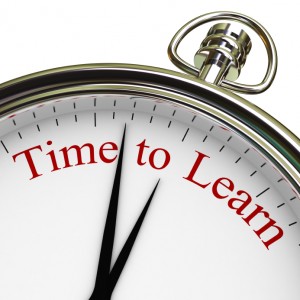Time is money when it comes to training. The longer it takes, the more it costs. A training failure is even more expensive. You already paid for it once and now you have to pay for it all over again. Here are five ideas to help you make your help desk training program faster and more effective.
 The Goal. Your ultimate goal is for trainees to understand and retain the information you teach them. We can all remember cramming for a test in school. We were totally focused on passing the test. Unfortunately, two days later we could barely remember anything we learned. Testing is important, but be careful that you are not so wrapped up in scoring that you don’t know how much of your training is really being understood and retained. Provide smaller more frequent tests rather than big “finals” and have trainees show you that they can actually perform a specific process before you move on.
The Goal. Your ultimate goal is for trainees to understand and retain the information you teach them. We can all remember cramming for a test in school. We were totally focused on passing the test. Unfortunately, two days later we could barely remember anything we learned. Testing is important, but be careful that you are not so wrapped up in scoring that you don’t know how much of your training is really being understood and retained. Provide smaller more frequent tests rather than big “finals” and have trainees show you that they can actually perform a specific process before you move on.
People learn differently. Each of your trainees may take in information through a different learning path. Some people are very visual. They need to see diagrams, read instructions, etc. A second category of people are auditory. They need to hear things being explained. The third category is kinesthetic. They need to touch things and learn by doing. Don’t try to cram a square peg into a round hole or you will lengthen your training time considerably. Be prepared to adjust your training to your audience. There are very accurate learning style tests available that you can administer before the training process even begins. We even ask each trainee “Tell me how you learn the best?” and then we act accordingly.
The Why. Trainees will retain more, and be more compliant with procedures after they graduate, if they understand the reasons for the processes you are asking them to follow. Telling them “do it this way because I said so” is never as effective as a true explanation of the reasoning behind the things you are asking them to do. It is very important to tell trainees “There are NO dumb questions and you can never ask too many questions. We want you to truly understand what you are doing and why you are doing it”.
Alternate Training & Practice. Alternate classroom training with hands-on practice taking specific types of calls. Allow trainees to interact with the computer applications they will be using. This will boost information retention significantly. By allowing them to tackle one subject at a time, then practice it, you will create a frame-of-reference that sticks. Hosing trainees down with huge amounts of conceptual information without having them actually perform processes in the order they will occur means they will forget a minimum of 30% of their training! They also need a break at least every 90 minutes or they will simply stop absorbing new information.
Mentoring. We take mentoring so seriously that new employees grade their co-workers on how helpful they have been in answering questions, providing guidance, etc. We have an explicit company policy that it is everyone’s job to help new employees learn and perform their job well. Graduates can also request additional training on any subject at any time.
What new support systems could you provide to your trainees to help them learn faster and remember more?
This blog was written by Laurie Leonard, the President of SUITE 1000, a U.S. based national telephone answering service, inbound call center and outsourced call center service. Her company has specialized in handling legal intake, sales leads, email lead response, appointment scheduling, customer service and help desk calls for over 20 years.
Copyright © 2025 SUITE 1000. All rights reserved.

